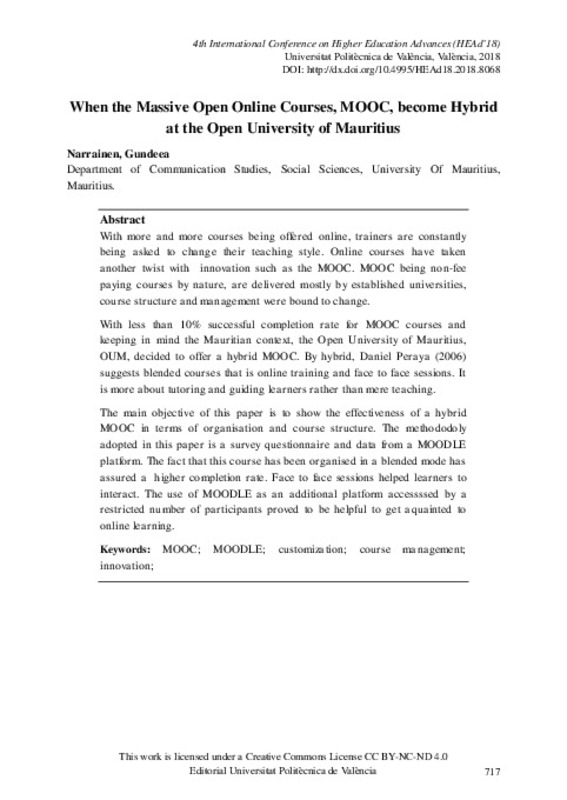JavaScript is disabled for your browser. Some features of this site may not work without it.
Buscar en RiuNet
Listar
Mi cuenta
Estadísticas
Ayuda RiuNet
Admin. UPV
When the Massive Open Online Courses, MOOC, become Hybrid at the Open University of Mauritius
Mostrar el registro sencillo del ítem
Ficheros en el ítem
| dc.contributor.author | Narrainen, Gundeea
|
es_ES |
| dc.date.accessioned | 2018-10-05T13:26:56Z | |
| dc.date.available | 2018-10-05T13:26:56Z | |
| dc.date.issued | 2018-10-05T13:26:56Z | |
| dc.identifier.isbn | 9788490486900 | es_ES |
| dc.identifier.issn | 2603-5871 | |
| dc.identifier.uri | http://hdl.handle.net/10251/109706 | |
| dc.description.abstract | [EN] With more and more courses being offered online teachers are constantly being asked to change their teaching style. Online courses have taken another turn with the innovation, which are the MOOCs. MOOCs being non-fee paying courses, delivered mostly by recognised universities, course organisation and management was bound to change. With less than 10% successful completion rate for MOOC courses and keeping in mind the Mauritian context, the Open University of Mauritius decided to offer a hybrid MOOC. By hybrid Daniel Peraya suggests blended courses that is online training and face-to-face sessions. It is more about tutoring and guiding students rather than mere teaching. Our main objective is to show the effectiveness of a Hybrid MOOC in terms of organisation and course structure. The methods used in this paper are: a survey questionnaire and data from a Moodle platform. The fact that this course has been organised in a blended mode has helped the participants to reach the end of the training with a higher completion rate, face to face sessions helped students to interact, the use of Moodle as an additional platform accessssed by a restricted number of participants proved to be helpful to get aquainted to online learning. | es_ES |
| dc.description.uri | http://ocs.editorial.upv.es/index.php/HEAD/HEAD18 | es_ES |
| dc.format.extent | 8 | |
| dc.language | Inglés | es_ES |
| dc.publisher | Editorial Universitat Politècnica de València | es_ES |
| dc.relation.ispartof | 4th International Conference on Higher Education Advances (HEAD'18) | |
| dc.rights | Reconocimiento - No comercial - Sin obra derivada (by-nc-nd) | es_ES |
| dc.subject | Higher Education | es_ES |
| dc.subject | Learning | es_ES |
| dc.subject | Educational systems | es_ES |
| dc.subject | Teaching | es_ES |
| dc.subject | MOOC | |
| dc.subject | MOODLE | |
| dc.subject | Customization | |
| dc.subject | Course management | |
| dc.subject | Innovation | |
| dc.title | When the Massive Open Online Courses, MOOC, become Hybrid at the Open University of Mauritius | es_ES |
| dc.type | Comunicación en congreso | es_ES |
| dc.type | Capítulo de libro | es_ES |
| dc.identifier.doi | 10.4995/HEAD18.2018.8068 | es_ES |
| dc.rights.accessRights | Abierto | es_ES |
| dc.description.bibliographicCitation | Narrainen, G. (2018). When the Massive Open Online Courses, MOOC, become Hybrid at the Open University of Mauritius. Editorial Universitat Politècnica de València. 717-724. https://doi.org/10.4995/HEAD18.2018.8068 | es_ES |
| dc.description.accrualMethod | OCS | es_ES |
| dc.relation.conferencename | Fourth International Conference on Higher Education Advances | es_ES |
| dc.relation.conferencedate | Junio 20-22,2018 | es_ES |
| dc.relation.conferenceplace | Valencia, Spain | es_ES |
| dc.relation.publisherversion | http://ocs.editorial.upv.es/index.php/HEAD/HEAD18/paper/view/8068 | es_ES |
| dc.description.upvformatpinicio | 717 | |
| dc.description.upvformatpfin | 724 | |
| dc.type.version | info:eu-repo/semantics/publishedVersion | es_ES |
| dc.relation.pasarela | OCS\8068 | es_ES |








